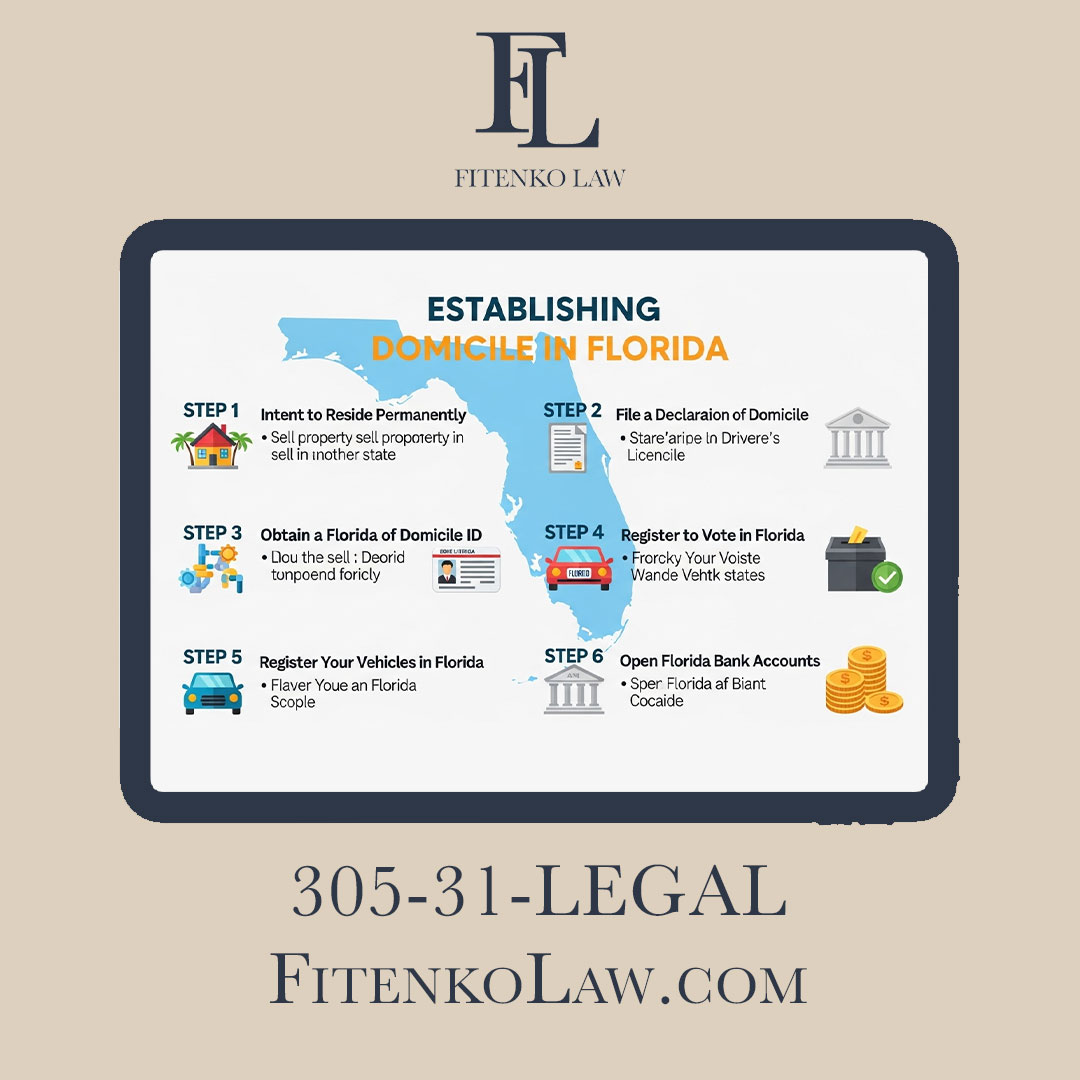Your Comprehensive Guide to Establishing Florida Domicile
Welcome to the Sunshine State! Moving to Florida offers an unparalleled lifestyle, from our world-class beaches in Hallandale Beach and Sunny Isles to the vibrant culture of Aventura. However, becoming a true Floridian in the eyes of the law involves more than just a change of address. Establishing legal domicile is a critical step, especially for high-net-worth individuals and international clients seeking to benefit from the state’s favorable tax laws and asset protection measures. This guide provides a detailed roadmap for navigating this crucial process.
At Fitenko Law, we specialize in guiding new residents through the complexities of Florida law. Our expertise in Immigration Law, Real Estate Law, and Estate Planning ensures a seamless transition. This post will walk you through the essential steps, from understanding the core legal concepts to leveraging the significant financial advantages Florida offers. For personalized guidance, contact our office in Hallandale Beach.
Understanding the Core Concepts: Residency vs. Domicile
Before diving into the process, it’s crucial to understand the legal distinction between “residency” and “domicile.” While often used interchangeably, these terms have distinct legal meanings with significant consequences. For instance, you can have multiple residences, but you can only have one legal domicile at a time. Florida law defines domicile as your one true, fixed, and permanent home. It is the place where you intend to return whenever you are absent.
This distinction is paramount for tax purposes. Your domicile is what determines your legal jurisdiction for income taxes, estate taxes, and other financial obligations. Merely owning a vacation home in Florida does not automatically make you a domiciliary. Instead, you must demonstrate a clear intent to make Florida your permanent base and sever ties with your previous state or country. Our team at Fitenko Law frequently assists clients in documenting this intent effectively.
Why Domicile Matters: The Florida Advantage
Establishing domicile in Florida unlocks numerous benefits that are particularly attractive to our clients in South Florida. The most significant advantage is the absence of a state income tax, a state estate tax, or an inheritance tax. This can result in substantial tax savings, allowing you to preserve more of your wealth for your family and investments. For example, a business owner moving from a high-tax state could see their tax burden decrease dramatically.
Moreover, Florida offers robust asset protection laws, including the highly-valued homestead exemption. This protection can shield your primary residence from creditors, providing peace of mind. For international clients, establishing Florida domicile can also play a role in their broader immigration and investment strategies. Our attorneys are skilled at aligning your residency goals with your long-term financial and personal objectives.
The Three Pillars of Establishing Florida Domicile
Successfully establishing domicile in Florida hinges on proving your intent. Florida courts and the Department of Revenue look for clear, demonstrable actions that confirm Florida is your permanent legal home. This process can be broken down into three essential pillars: formal declarations, informal acts, and severing ties with your former jurisdiction. Navigating these requirements requires careful planning and execution, areas where our legal team excels.
Pillar 1: Formal Declarations of Domicile
The first and most direct step is to make a formal declaration of your intent. Florida law provides a specific mechanism for this: filing a Declaration of Domicile. This sworn statement is recorded in the public records of the Florida county where you reside. While not the sole factor, it is a powerful piece of evidence that officially announces your intention to make Florida your permanent home. You can file this document with the clerk of the circuit court.
The form is straightforward, requiring your name, details of your new Florida address, and information about your previous domicile. By signing it, you are affirming under oath that you have established your new permanent residence in Florida. Our Hallandale Beach attorneys can prepare and file this declaration on your behalf, ensuring it is completed accurately and recorded properly. This is often the first action we recommend for clients serious about their move.
Other Key Governmental Filings
Beyond the Declaration of Domicile, several other official steps are critical. Each action creates a paper trail that reinforces your connection to Florida. These include:
- Florida Driver’s License or ID Card: Obtaining a Florida driver’s license within 30 days of establishing residency is required by law and serves as strong proof of domicile. You will need to surrender your out-of-state license.
- Vehicle Registration: Similarly, you must register your vehicles in Florida. This demonstrates that your primary assets are based in the state.
- Voter Registration: Registering to vote in your new Florida county is a powerful indicator of your intent to participate in the local community as a permanent resident. Be sure to cancel your previous voter registration.
- U.S. Postal Service: File a permanent change of address with the U.S. Postal Service to have all your mail forwarded to your Florida home.
These formal acts are foundational. They signal to government agencies and tax authorities that you have taken concrete steps to integrate into the Florida system. For assistance with any of these processes, Fitenko Law is here to help.
Pillar 2: Informal Acts and Lifestyle Integration
While formal declarations are essential, your day-to-day actions must align with your stated intent. Tax auditors, for example, will scrutinize your lifestyle to ensure it is centered in Florida. This means more than just spending time here; it involves moving the “center of your life” to the state. This is where many individuals inadvertently create ambiguity, so careful attention to detail is key.
Think of it as weaving the fabric of your life into the Florida community. This includes where you work, where your children go to school, where you worship, and where you engage in social activities. For instance, joining a local country club in Aventura or a yacht club in Sunny Isles can be compelling evidence. These actions demonstrate a commitment that goes beyond mere property ownership. Our Aventura lawyers can provide tailored advice on building a strong case for domicile.
Building Your Florida Footprint: A Checklist
To demonstrate that Florida is the center of your life, consider the following actions:
- Financial and Professional Life:
- Open bank accounts with a Florida-based bank or a national bank with a strong local presence.
- Move the contents of your safe deposit box to a Florida institution.
- Engage local professionals, such as doctors, dentists, accountants, and attorneys. We invite you to learn more about our firm and how we serve the South Florida community.
- If you are a business owner, register your business to operate in Florida.
- Update your address on all financial accounts, including credit cards, investment portfolios, and insurance policies.
- Personal and Social Life:
- Join local clubs, charities, or religious organizations in communities like Hallandale Beach or Sunny Isles.
- Obtain a library card from your local library.
- Subscribe to local newspapers or publications.
- If you have children, enroll them in a Florida school.
- Update your address on social media profiles and personal correspondence.
Each of these steps, while seemingly small, contributes to a larger narrative. They collectively paint a picture of a life that is genuinely and permanently based in Florida. We can help you create a personalized checklist when you schedule a consultation.
Pillar 3: Severing Ties with Your Former Domicile
Establishing Florida domicile is as much about leaving your old home as it is about embracing your new one. You must take clear, affirmative steps to cut ties with your previous state or country. Failure to do so can create a “dual residency” issue, potentially exposing you to taxation in both jurisdictions. This is a common pitfall, especially for those who maintain significant connections to their former home.
Imagine a client from New York who has purchased a condo in Sunny Isles. They have a Florida driver’s license but still own their New York home, visit their New York doctors, and maintain active club memberships there. The New York tax authorities could argue that they never truly relinquished their New York domicile. Therefore, proactive and thorough severance is not just recommended; it is essential.
A Practical Guide to Cutting Ties
To avoid any ambiguity about your intentions, you must systematically disconnect from your prior state. This process demonstrates that your move to Florida is permanent and not a temporary relocation. Here are some critical steps to take:
- Sell Your Former Primary Residence: The most convincing action is to sell your home in your previous state. If you retain property there, it should ideally be reclassified as a vacation home or investment property, not your primary residence.
- Resign from Clubs and Organizations: Formally resign from any social, professional, or religious organizations in your former state. If you wish to maintain a connection, change your membership status to “non-resident.”
- Update Legal and Estate Planning Documents: This is a crucial step. Your will, trusts, and powers of attorney should be updated to reflect Florida law and your new domicile. This is a core part of our estate planning services.
- File a Final Resident Tax Return: In your former state, file a final income tax return as a “part-year resident.” This officially notifies the tax authorities of your move.
- Close Out-of-State Bank Accounts: If possible, close accounts with local banks in your old state to centralize your finances in Florida.
By taking these definitive actions, you leave no room for doubt. You are making a clear statement that Florida is your one and only permanent home. For a comprehensive review of your situation, we encourage you to browse our law blog or contact us directly.
The Florida Homestead Exemption: A Cornerstone of Residency
One of the most significant financial benefits of establishing Florida domicile is the ability to claim the homestead exemption. This valuable protection is enshrined in the Florida Constitution and provides two key advantages: a reduction in property taxes and protection from creditors. Understanding and properly applying for this exemption is a critical task for every new Florida homeowner.
The homestead exemption can reduce the assessed value of your primary residence by up to $50,000 for property tax purposes. This translates into direct, annual savings. Furthermore, the “Save Our Homes” cap limits the annual increase in the assessed value of your homestead property, protecting you from sharp rises in property taxes. Our real estate law practice is well-versed in maximizing these benefits for our clients.
How to Qualify and Apply for the Homestead Exemption
To qualify for the homestead exemption, you must meet two primary criteria as of January 1st of the tax year. First, you must have legal or equitable title to the property. Second, the property must be your permanent residence. This is another area where the concept of domicile is critical. You cannot claim a homestead exemption on a vacation home or investment property.
The application process is managed at the county level by the property appraiser’s office. The deadline to file is typically March 1st. When you apply, you will need to provide documentation that proves both ownership and residency. This often includes:
- A copy of the recorded deed to your property.
- Your Florida driver’s license or ID card showing your homestead address.
- Your Florida vehicle registration.
- Your voter registration card.
- A copy of your recorded Declaration of Domicile.
Gathering these documents is straightforward if you have followed the steps to establish domicile. It is a seamless part of the overall transition process. For any questions about your eligibility, the team at Fitenko Law is ready to assist.
Asset Protection Benefits of the Homestead Exemption
Beyond the tax savings, Florida’s homestead law provides some of the strongest asset protection in the country. With certain exceptions, it can protect your primary residence from forced sale by creditors. This means that if you face a lawsuit or a judgment, your home may be shielded. This protection is unlimited in value, though it is limited by acreage: up to one-half acre within a municipality or up to 160 contiguous acres outside a municipality.
This protection is a powerful tool in any comprehensive estate plan, especially for professionals and business owners who may face higher liability risks. It is a key reason why so many individuals choose to make Florida their permanent home. However, it is important to note that the protection does not apply to consensual liens, such as your mortgage, or to liens for property taxes or construction work on the home. For a detailed analysis of how homestead protection fits into your financial picture, contact our attorneys.
Estate Planning for New Florida Residents
Moving to Florida necessitates a thorough review and update of your estate plan. The laws governing wills, trusts, and probate administration vary significantly from state to state. An estate plan that was perfectly valid in your previous state may not be optimal or fully effective under Florida law. Failing to update your documents can lead to unintended consequences, family disputes, and unnecessary expenses during probate.
At Fitenko Law, we emphasize a proactive approach to estate planning for new residents. We begin by analyzing your existing documents in the context of Florida’s legal framework. From there, we work with you to craft a new plan that reflects your wishes, maximizes tax advantages, and ensures a smooth transfer of assets to your heirs. This process is essential for anyone serious about protecting their legacy.
Updating Your Will and Revocable Trust
Your last will and testament is the cornerstone of your estate plan. While a will executed in another state may be valid in Florida if it met the legal requirements of that state at the time of signing, it is always best practice to execute a new Florida will. This avoids any potential challenges or complications during the probate process. A Florida will also allows you to nominate a personal representative (executor) who is familiar with Florida’s procedures.
Similarly, if you have a revocable living trust, it should be reviewed and likely restated under Florida law. A Florida-based trust ensures that its administration will be governed by the Florida Trust Code, providing clarity and efficiency. This is also an opportune time to ensure your trust is properly funded with your Florida assets, particularly your new homestead property. Our attorneys can guide you through the process of titling assets in the name of your trust.
Advanced Estate Planning Considerations in Florida
For high-net-worth individuals and international clients, moving to Florida opens the door to advanced estate planning strategies. Given the absence of a state estate tax, the focus often shifts to minimizing federal estate taxes and maximizing asset protection. Some strategies to consider include:
- Irrevocable Trusts: Using various types of irrevocable trusts can help move assets out of your taxable estate while still providing benefits for your loved ones.
- Gifting Strategies: A coordinated gifting plan can reduce the size of your estate over time, taking advantage of the annual gift tax exclusion.
- Business Succession Planning: If you are a business owner, a move to Florida is the perfect time to establish a robust succession plan that ensures the continuity of your enterprise.
- Charitable Planning: For those with philanthropic goals, Florida law provides many vehicles for charitable giving that can also offer tax benefits.
Our firm provides sophisticated legal services tailored to the unique needs of our clients in Hallandale Beach, Aventura, and Sunny Isles. We understand the interplay between immigration status, real estate holdings, and wealth preservation. Reach out to us to begin crafting your Florida estate plan.
A Legal Checklist for Moving to Miami and South Florida
The transition to becoming a Florida resident is a multi-step process that requires careful organization. To simplify this journey, we have compiled a legal checklist that summarizes the key actions discussed in this guide. This checklist is designed to help you stay on track and ensure you do not miss any critical steps. It serves as a practical roadmap for your move to vibrant South Florida communities.
While this checklist is comprehensive, every individual’s situation is unique. International clients, for example, may have additional considerations related to their immigration status and international assets. We always recommend consulting with an experienced attorney to tailor a plan that fits your specific circumstances. Consider this a starting point for your conversation with the team at Fitenko Law.
The Domicile Establishment Checklist
- Initial Actions (First 30 Days):
- File a Declaration of Domicile with the county clerk of court.
- Obtain a Florida Driver’s License or State ID Card.
- Register your vehicles in Florida.
- Register to vote in Florida and cancel your previous registration.
- File a permanent change of address with the USPS.
- Financial and Legal Integration:
- Open new bank accounts with a Florida-based institution.
- Update your address on all financial, insurance, and investment accounts.
- Engage local Florida professionals (doctor, dentist, CPA).
- Consult with a Florida attorney to update your estate plan. This is a service we proudly offer at Fitenko Law.
- If applicable, register your business to operate in Florida.
- Property and Asset Management:
- Purchase or lease a primary residence in Florida.
- Apply for the Florida Homestead Exemption by the March 1st deadline. Review the official guidelines on the Florida Department of Revenue website.
- Sell your former primary residence or re-title it as a secondary/investment property.
- Move valuable personal property (art, jewelry, etc.) to your Florida home.
- Severing Ties with Your Former State:
- File a final, part-year resident tax return in your former state.
- Resign from non-resident memberships in clubs and organizations.
- Close out local bank accounts in your prior state of residence.
- Notify all relevant parties (family, friends, business contacts) of your permanent move.
This checklist provides a solid framework for action. For a detailed discussion of how these steps apply to you, especially if you are navigating the process from another country, our immigration attorneys can provide invaluable guidance. We are committed to making your move to Florida as smooth and legally sound as possible.
Fitenko Law: Your Partner in Transitioning to Florida
Establishing domicile in Florida is a significant legal and financial undertaking. It requires meticulous planning, decisive action, and a deep understanding of state law. As this guide has shown, the benefits are substantial, from significant tax savings to robust asset protection. However, the process is fraught with potential pitfalls that can jeopardize your goals if not handled correctly. This is where expert legal counsel becomes indispensable.
At Fitenko Law, we serve as trusted advisors to clients moving to South Florida’s premier communities, including Hallandale Beach, Aventura, and Sunny Isles. Our boutique firm is uniquely positioned to handle the interconnected challenges of immigration, real estate, and estate planning that often accompany a major relocation. We provide personalized, strategic guidance tailored to the sophisticated needs of our domestic and international clientele.
Do not leave your Florida future to chance. Let our experience be your advantage. We will ensure that every document is filed correctly, every legal requirement is met, and your transition to the Sunshine State is seamless and successful. We invite you to explore our website, learn more about our practice areas, and read our insightful blog. When you are ready to take the next step, contact Fitenko Law today to schedule a confidential consultation and begin your journey to becoming a Floridian.






